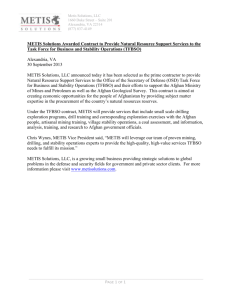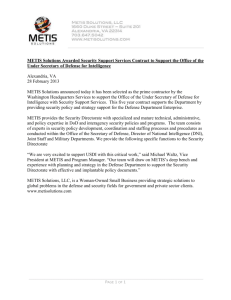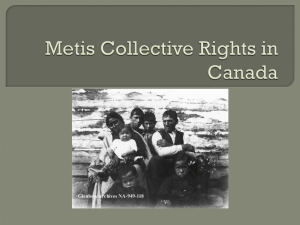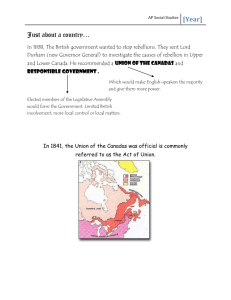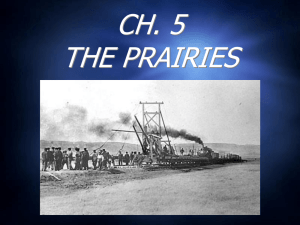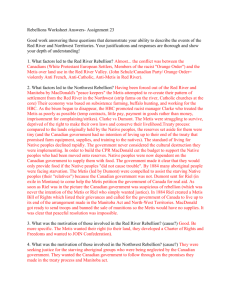Historical Overview
advertisement
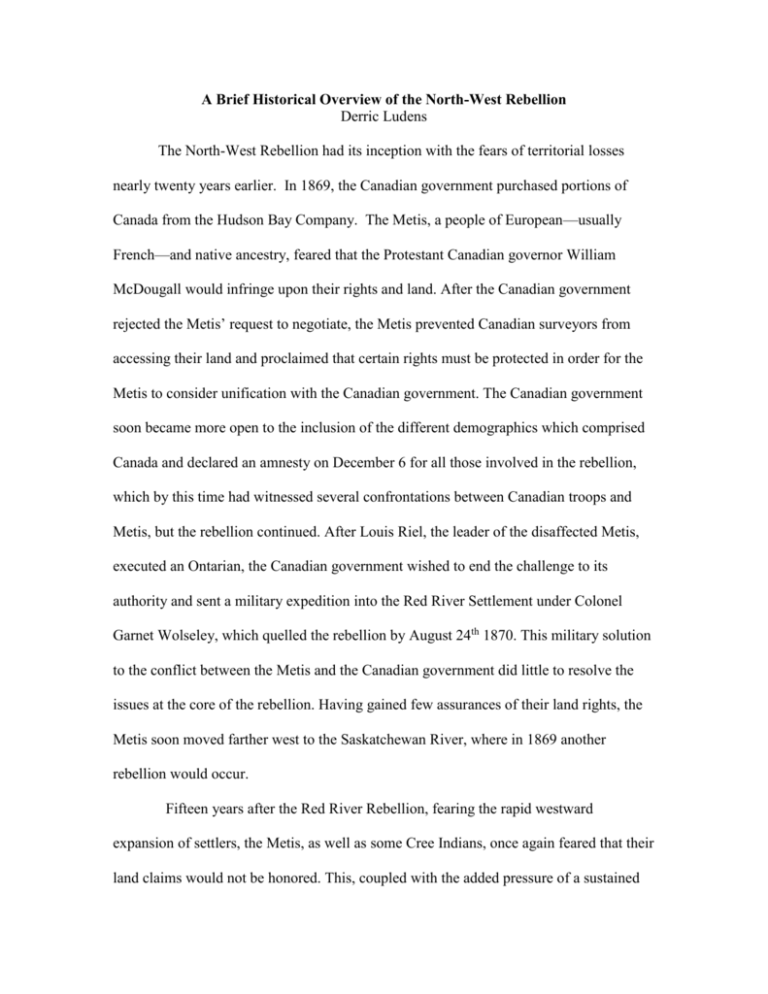
A Brief Historical Overview of the North-West Rebellion Derric Ludens The North-West Rebellion had its inception with the fears of territorial losses nearly twenty years earlier. In 1869, the Canadian government purchased portions of Canada from the Hudson Bay Company. The Metis, a people of European—usually French—and native ancestry, feared that the Protestant Canadian governor William McDougall would infringe upon their rights and land. After the Canadian government rejected the Metis’ request to negotiate, the Metis prevented Canadian surveyors from accessing their land and proclaimed that certain rights must be protected in order for the Metis to consider unification with the Canadian government. The Canadian government soon became more open to the inclusion of the different demographics which comprised Canada and declared an amnesty on December 6 for all those involved in the rebellion, which by this time had witnessed several confrontations between Canadian troops and Metis, but the rebellion continued. After Louis Riel, the leader of the disaffected Metis, executed an Ontarian, the Canadian government wished to end the challenge to its authority and sent a military expedition into the Red River Settlement under Colonel Garnet Wolseley, which quelled the rebellion by August 24th 1870. This military solution to the conflict between the Metis and the Canadian government did little to resolve the issues at the core of the rebellion. Having gained few assurances of their land rights, the Metis soon moved farther west to the Saskatchewan River, where in 1869 another rebellion would occur. Fifteen years after the Red River Rebellion, fearing the rapid westward expansion of settlers, the Metis, as well as some Cree Indians, once again feared that their land claims would not be honored. This, coupled with the added pressure of a sustained drought, compelled the Metis to send an envoy to Louis Riel, who had led the Red River Rebellion of 1869 and subsequently fled to Montana. After returning to Canada at the behest of the Metis, Riel, a catholic priest and self-proclaimed prophet, sent several petitions to the Canadian government requesting assurances that the Metis’ land claims would be honored, but after no action was taken by the Canadian government, Riel declared an autonomous provisional government in 1885 and ordered all governmental officials out of the North-West Territories. Although some Cree Indians participated in the rebellion, its leadership—most notably Poundmaker and Big Bear—held substantial reservations concerning the course set upon by the Metis, but the younger warriors in some of the tribes continued to propel them further into the conflict. Despite their legitimate grievances with the government’s neglect of treaty promises, more Indians rejected all invitations and opportunities to participate in the rebellion than joined it. By April 10th 1885, Cree Indians had captured Battleford, the territorial capital of Saskatchewan, and on the 24th of April, a group of Metis defeated a militia at Fish Creek led by the British General Frederick Middleton. But these initial successes accomplished little more than providing a source of morale for Riel and the independence movement, while simultaneously giving the government an impetus to quell the rebellion quickly. Less than a month later, the Metis, who provided the core of the rebellion, were defeated at Batoche by General Middleton, effectively ending the rebellion. Riel was soon captured and convicted of treason and was hanged on November 16th. Sources Consulted Barron, F. Laurie. “Poundmaker.” In Encyclopedia of the Great Plains. Edited by David Wishart. Lincoln: University of Nebraska Press, 2004. Dempsey, Hugh A. “Big Bear.” In Encyclopedia of the Great Plains. Edited by David Wishart. Lincoln: University of Nebraska Press, 2004. Ens, Gerhard J. “Red River Resistance.” In Encyclopedia of the Great Plains. Edited by David Wishart. Lincoln: University of Nebraska Press, 2004. ____________. “Metis.” In Encyclopedia of the Great Plains. Edited by David Wishart. Lincoln: University of Nebraska Press, 2004. Francis, R. Douglas, Richard Jones, and Donald B. Smith. Destinies: Canadian History since Confederation. 6th ed. Toronto: Nelson Education, 2007. Francis, R. Douglas and Donald B. Smith. Readings in Canadian History PostConfederation. 6th ed. Toronto: Nelson Thomson Learning, 2002. Huel, Raymond J. A. “Louis Riel” In Encyclopedia of the Great Plains. Edited by David Wishart. Lincoln: University of Nebraska Press, 2004. Macleod, R.C. “North-West Rebellion.” In The Oxford Companion to Canadian History. Edited by Gerald Hallowell. New York: Oxford University Press, 2004. Porsild, Charlene. “North-West Rebellion.” In Encyclopedia of the Great Plains. Edited by David Wishart. Lincoln: University of Nebraska Press, 2004.


